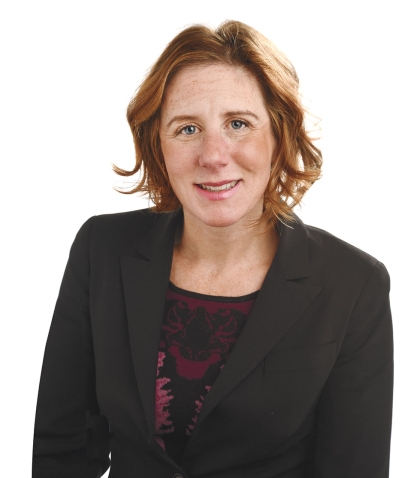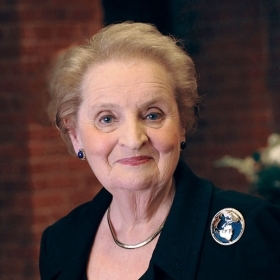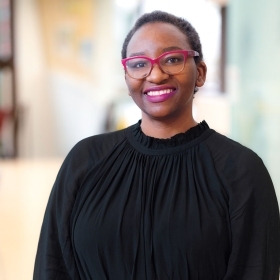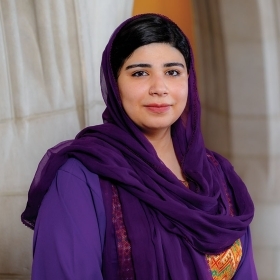Photo by Richard Howard
Earlier this year, Stacie Goddard, the Mildred Lane Kemper Professor of Political Science and the faculty director of the Madeleine Korbel Albright Institute for Global Affairs, and her husband, Paul McDonald, also a faculty member in the political science department and on sabbatical, packed up their daughters, dogs, and cats and moved to Northern California for the year to be closer to family and to Stanford University, where Goddard is a faculty affiliate at the Center for International Security and Cooperation.
Goddard’s research focuses on great power politics and international security, including why and how states engage in war and how they seek to gain and maintain legitimacy on the international stage. The power of competition largely had “taken a back burner” in world affairs, she says. “It didn’t really seem like there was much competition, at least for the United States as a power.”
When we spoke in mid-February, the Olympics were about to wrap up, North Korea had just completed a historic round of ballistic missile tests, and Russia was days away from invading Ukraine.
As she watches events play out on the global stage, Goddard says she’s “seeing dynamics that you knew were likely to happen. But to be clear, that doesn’t mean that you wanted it to happen. … When most of us get into fields like this, we’re doing it because we want to think about ways to mitigate these competitive moments.”
Moments like these, Goddard says, make her think, “I do this academic work. How can I use this to make this moment explicable to a broader audience?” She’s been doing that as an editor and contributor for “The Monkey Cage” (the monkeycage.org), a blog written by political scientists and published by the Washington Post. TMC publishes 1,000-word explainers on world affairs. Recently, she wrote a piece headlined “Xi and Putin have declared a united front against the United States,” suggesting that the powers’ joint statement in February revealed strong views about sovereignty and territorial integrity—and opposition to outside interference.
Goddard welcomes opportunities to reflect on her work and ask, “How do I keep my audience—whether that’s Washington Post readers or Wellesley students—engaged?” That’s something she faced earlier this year when, for the second time, the Albright Institute’s three-week Wintersession program moved online due to the pandemic. It was her third year as faculty director of the institute. Goddard, program director Rebecca Gordan ’01, and the institute’s staff had to make the switch from a hybrid program to entirely virtual.
Goddard was concerned that the move to virtual would cause some Albright fellows—Wellesley students chosen from across the majors and disciplines to participate in the institute—to walk away, saying, “I’m just done with Zoom.” But she says she was astonished at how well it went. “That would sound like I’m bragging, except for the fact that [it went] that well because of what the fellows [brought] to it,” Goddard says. “These fellows just came in like, ‘We’re going to make this happen.’”
A highlight of the program was a discussion between Madeleine Korbel Albright ’59 and María Eugenia Brizuela de Ávila, minister of foreign affairs of El Salvador from 1999 to 2004. On Jan. 19, the women shared stories about working across borders to “explode outward the boundaries of what is achievable on this Earth,” a reference to a line from Albright’s commencement address at Mount Holyoke College in 1997.
As this issue of the magazine was in production, Albright died at age 84 of cancer (see “In Memoriam”). Once again, Goddard found herself discussing the significance of the moment with a broad audience, speaking with national media outlets about the influence Wellesley had on Albright, and the impact she had on the College. In a Wellesley Spotlight story, Goddard said, “The Albright Institute doesn’t just bear Secretary Albright’s name. It carries her spirit. Madeleine Albright taught us that being a diplomat means approaching even the most difficult problems with empathy and humor, without abandoning your principles along the way. She showed us that good leadership isn’t about any single individual, but about collaboration and cooperation across our differences.”
This spring, the Albright Institute faculty and staff are selecting the next cohort of Albright fellows. Goddard looks forward to teaching next January—whatever 2023 has in store for the College and the world.








We ask that those who engage in Wellesley magazine's online community act with honesty, integrity, and respect. (Remember the honor code, alums?) We reserve the right to remove comments by impersonators or comments that are not civil and relevant to the subject at hand. By posting here, you are permitting Wellesley magazine to edit and republish your comment in all media. Please remember that all posts are public.